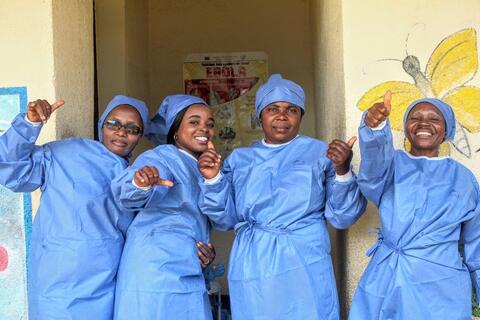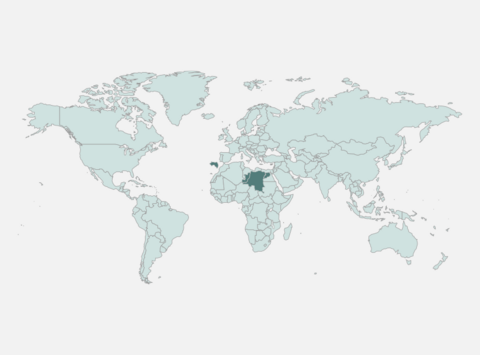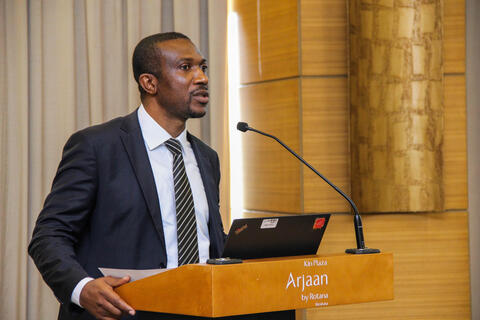Introduction
The ongoing mpox epidemic in South Africa has significantly impacted men who have sex with men (MSM) and sex workers, particularly in urban, peri-urban, and informal settlements in Gauteng, KwaZulu-Natal, and the Western Cape. Systemic barriers such as limited healthcare access, weak social support, and pervasive stigma exacerbate these challenges. Often labelled derogatorily as a "gay disease" or "gay-pox," the epidemic has fuelled fear, self-stigmatisation, and healthcare avoidance, particularly among people living with HIV, who are at greater risk of severe outcomes.
In response, the South African Red Cross Society (SARCS), in collaboration with the National Institute for Communicable Diseases (NICD), the National Department of Health (NDoH), and local organisations, conducted a Rapid Qualitative Assessment (RQA) in October 2023. This assessment explored barriers and needs among marginalised groups to inform targeted interventions addressing stigma and improving healthcare inclusivity. SARCS’s mpox response and preparedness strategy included capacity-building efforts at national and provincial levels, focusing on Epidemic Control for Volunteers (ECV), Epidemic Preparedness in Communities (EPiC), and eCommunity-Based Health and First Aid (eCBHFA). Additionally, SARCS expanded community feedback mechanisms and Risk Communication and Community Engagement (RCCE) activities to strengthen public health responses and promote trust in the healthcare system. The collaborative effort during the RQA exemplified a multi-stakeholder approach to tackling the epidemic. SARCS led the community engagement efforts and provided trained volunteers, while the NICD offered
epidemiological expertise and diagnostic support. The NDoH ensured alignment with public health policies and technical guidance, and local NGOs facilitated trust-building and safe spaces for data collection. This partnership enabled the RQA to address key barriers and generate actionable insights for inclusive and effective interventions
Methodology
The RQA utilised mixed qualitative methods, including interviews, focus group discussions (FGDs), and community mapping in high-risk areas, engaging MSM, sex workers, healthcare workers, community members and their leaders. It explored healthcare-seeking behaviours, stigma, and outreach needs. Community feedback sessions offered practical strategies to reduce stigma and enhance service delivery. SARCS continues its RCCE activities, reaching over 70,000 people nationwide to promote awareness and inclusivity .
Key Findings
Stigma tied to homophobia and misinformation deterred mpox care, especially among MSM and sex workers, worsening vulnerabilities such as economic insecurity and limited healthcare access (Figure 2). Myths, such as mpox being solely sexually transmitted, persisted. Participants recommended leveraging trusted community figures, targeted outreach to informal settlements, and training healthcare workers to deliver inclusive, stigma-free care to rebuild trust.
Intervention Strategies
SARCS trained over 200 peer educators and volunteers across all nine provinces to form Outbreak Response Teams skilled in RCCE and epidemic control. These teams engaged MSM and sex workers as well as those who are not from key populations with accurate mpox information through events and social media. Sensitisation training for healthcare workers and volunteers emphasised patient-centred care, addressing unconscious bias, and meeting the unique needs of key populations. These efforts were supported by ECV, EPiC, and eCBHFA training, which equipped volunteers to address health challenges holisti- cally.
To further address barriers, SARCS set up gazebos in informal settlements and peri-urban areas to provide integrated health services such as mpox education, health screenings, first aid, and referrals, fostering trust and accessibility. Feedback from these interventions revealed reduced stigma and improved healthcare-seeking beha- viour among vulnerable groups.
Outcomes and Impact
SARCS significantly increased healthcare access for key populations, with over 1,500 individuals reached through community outreach in Gauteng and a 40% rise in MSM and sex workers accessing mpox-related services in targe- ted areas since August 2024. Over 100,000 individuals benefited from accurate information during 20 outreach events led by volunteers and peer educators, promoting stigma reduction. The initiative’s success has integrated inclusivity training into SARCS’ broader public health programs, ensuring sustained support for marginalised communities through ongoing volunteer and staff training.
Lessons Learned
Community-led approaches were pivotal in addressing stigma and misinformation. Peer educators and trusted influencers bridged gaps between healthcare providers and marginalised populations, building trust and improving service accessibility. Sensitisation training for volunteers enhanced inclusivity, while integrating ECV, EPiC, and eCBHFA modules ensured a comprehensive epidemic response. Community-based touchpoints, such as pop-up information hubs, prioritised accessibility, enabling even the most marginalised to access accurate health information and services. These hubs fostered continuous community engagement and trust, demonstrating the importance of inclusive and accessible healthcare interventions.
Conclusion
The RQA underscored the importance of community-led interventions in addressing stigma and improving healthcare access for key populations affected by mpox. By engaging trusted community figures, providing inclusive healthcare training, and establishing accessible outreach points, SARCS and its partners have taken significant steps toward reducing the impact of mpox on vulnerable groups. Integrating training programs such as ECV, EPiC, and eCBHFA into SARCS’s broader health initiatives ensures the sustainability of these efforts.
The collaboration between SARCS, NICD, NDoH, and local organisations during the RQA highlights the power of multi-stakeholder partnerships in overcoming systemic barriers. By pooling their expertise and resources, these partners effectively tackled stigma, improved healthcare access, and built trust among key populations. The lessons learned from this initiative will guide ongoing efforts to promote health equity and inclusivity in South Africa. SARCS’s commitment to community-driven, stigma-free healthcare sets a benchmark for responding to epidemics in marginalised populations, demonstrating the power of collaboration and localised solutions.


